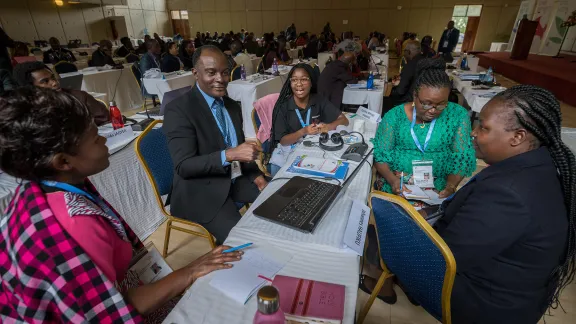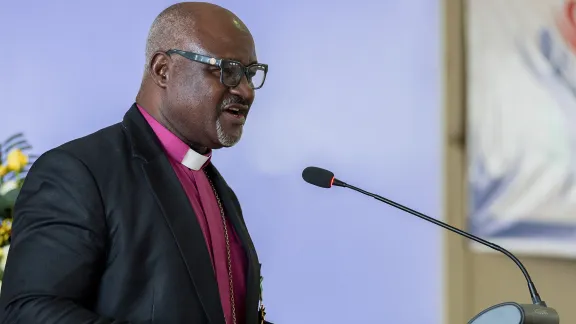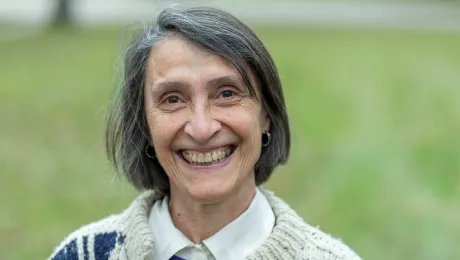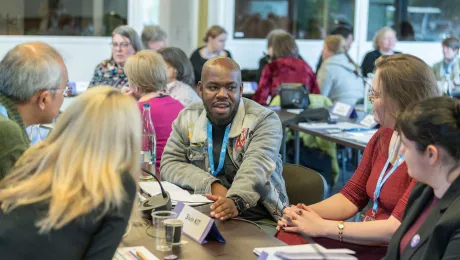Church leaders reflected on the work of Lutheran churches in Africa, their diverse contexts, joys and challenges, affirming the importance of the prophetic voice of the church.

Cynthia Mimagu Harases of the Evangelical Lutheran Church in The Republic of Namibia shares a remark during a group conversation during the Africa pre-assembly. Photo: LWF/Albin Hillert
Give direction, promote peace and human rights
Conflict and insecurity, the climate crisis, and a shrinking civic space in African societies. These were some of the crises highlighted by the Lutheran World Federation (LWF) President and leader of The Lutheran Church of Christ in Nigeria (LCCN) Archbishop Dr Panti Filibus Musa and other African church leaders as they reflected on the work and context of Lutheran churches in Africa.
During the regional Pre-Assembly, taking place in Nairobi, Kenya from 8 to 12 May, Archbishop Musa was joined by young activists, academics, LWF staff and other delegates to discuss regional joys and challenges, in preparation for the LWF Assembly coming up in Krakow Poland in September.
He explained that many people who flee from violence are forced to live under unbearable conditions in Internally Displaced Persons (IDP) Camps and this affects the identity of children born in the camps. “These challenges disrupt social structures and stability, resulting in fear, displacement, and loss of life.”
In his presentation, the LCCN Archbishop also expressed concern that the democratic and civic space in many African countries is shrinking dramatically. The prophetic voice of the church, he said, is urgently needed to give new direction and to promote peace and human rights.
Speaking about the impact of the COVID-19 pandemic in Africa, the Archbishop Musa noted the increase in sexual violence and domestic violence, and he called on the churches to work for gender justice through the transformation of societies. He said the challenges “also affect governance, economic development, education, healthcare, gender equality, social well-being of families, and infrastructure, worsening other existing challenges in many African nations.”

LWF president Archbishop Musa Panti Filibus addresses the Africa pre-assembly. Photo: LWF/Albin Hillert
Unity and interconnectedness
Reflecting on the Assembly theme, ‘One Body, One Spirit, One Hope’, Archbishop Musa said these words emphasize the unity and interconnectedness of the church in a world that is often marked by division and violence. To address conflict, both in the church and society, he said it is vital to focus on our “shared identity as the children of the body of Christ.” This identity, he added, “enables us to serve those who are in need.”
This Assembly theme, Archbishop Musa continued, gives hope to the Africa region. “The theme serves as a powerful reminder of unity, cooperation and hope in the life of the church today.” He noted that this hope is urgently needed because “the theme encourages us to hold onto hope and at the same time being sign of hope especially in a region struggling with issues of insecurity and fragilities.”
The LWF leader said that “violent acts have been carried out in Africa in the name of religion, including Christianity.” He noted that the misuse of spiritual texts and tribal discrimination are among the causes of violence and insecurity in Africa, exacerbating the political power struggles. He highlighted the challenge for churches in seeking “to promote nonviolent responses to violence.”
Urgency of the climate crisis
Mr Khulekani Sizwe Magwaza, an LWF council member from the Evangelical Lutheran Church in Southern Africa, and Mr. Micah Maro Maua from the Kenyan Evangelical Lutheran Church discussed the urgency of the climate crisis during a plenary session moderated by Rev Dr Adama Isa, a theologian from the LCCN. Magwaza called on the church to create more opportunities for young people to participate in work of advocating for climate justice. He said since young people are adversely affected by climate change, they need to be in the forefront of advocating and working towards climate justice, “Young people’s dynamic biological, psychosocial and cognitive development is being jeopardized by climate change,” he emphasized.
Maua said “the climate crisis in Africa is multi-dimensional with socio-economic, political and environmental factors intersecting.” He warned that “key development sectors have already experienced widespread losses and damages.” He called for more proactive engagement of the church and faith organizations in advocating and intervening for climate justice in Africa.
Continue engaging locally and globally
The LWF’s head of global advocacy Mr. Isaiah Toroitich and the director of the Lutheran Office for World Community (LOWC) Ms. Christine Mangale underlined the importance of advocacy in tackling these regional priorities. Toroitich highlighted how the African churches have addressed various human rights challenges and called on them to continue that work and continue engaging with international and local actors to propose sustainable solutions.
Mangale, on her part, encouraged LWF member churches in Africa to take advantage of the global offices to find solutions that are in line with the UN’s Sustainable Development Goals and can serve communities by providing better living standards for all.
The Thirteenth Assembly of the Lutheran World Federation takes place 13-19 September 2023 in Krakow, Poland. The theme of the Assembly will be "One Body, One Spirit, One Hope." It will be hosted by the Evangelical Church of the Augsburg Confession in Poland.


